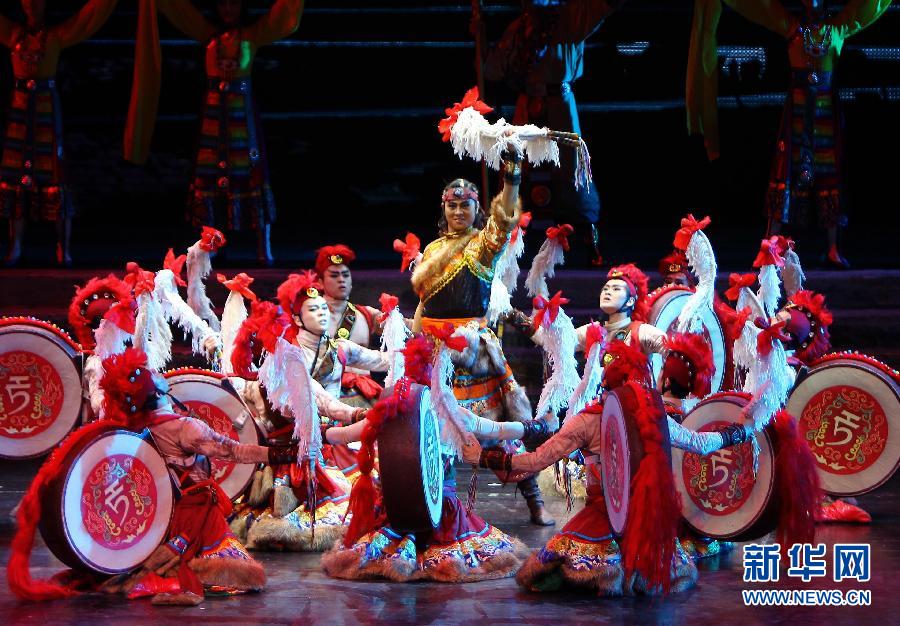Kelsang Nyima: inheritor of Tibetan folk proverbs

“I have two hobbies, to listen to “King Gesar” stories and to discuss proverbs,” said the 68-year-old Kelsang Nyima, keeping these words often on the tip of his tongue.
Born in Nagqu prefecture of northern Tibet, Kelsang Nyima has settled in Lhasa, capital of Tibet ever since he retired in 2005.
When walking into the Yamdrok Lake Teahouse in Banaxoi alley in Lhasa, you will see Kelsang Nyima drinking sweet tea, while discussing Tibetan proverbs with his “fans” if nothing unexpected happens.
“The hand must work hard to feed the mouth” and “without hard work, there is no sweet food,” said Kelsang, adding that these proverbs display the importance and love that Tibetan people attach to work and have distinct educational significance.
Another example is, he said, “if the incense burner is too good at scrubbing, the gold Buddha statue will be rubbed into brass”, which implies that everything starts from reality.
“Idleness leads to illness, hard work leads to ability”, “Genius is all about strong interest and relentless fascination” are about the relationship between knowledge and practice.
Kelang Nyima said that when he was young, he herded animals with adults like other children in pastoral areas.
When there was a break in herding, he often asked the adults to tell him stories about “King Gesar” and folk proverbs.
According to his own estimate, Kelsang Nyima can recite more than 2000 Tibetan folk proverbs. “Tibetan proverbs contain a wealth of productive knowledge and life experience.
They involve all areas of social life, and most of which relate to philosophy and moral cultivation.
The content is also wide-ranging with cognitive value and educational significance. They are certainly worth cherishing.”
“If all goes well, I plan to provide a permanent record of these Tibetan proverbs in the form of a book,” Kelsang Nyima said when talking about future plans.
“When teacher Kelsang has a spare moment, he likes to come here to drink tea and discuss proverbs with other guests.
He wants to pass on and raise awareness of Tibetan folk proverbs.
His fans often call him the ‘proverb guardian’ to show respect, “said QiongJi, boss of the teahouse.
“Work is happiness’s right hand and thrift is its left hand, so make sure you drink up”. Just as I was getting ready to leave, Kelsang Nyima pointed to the cup of unfinished tea and said this old Tibetan saying.
Your Comment
Name E-mailRelated News
-
;
-
-

-
Folk proverbs reflect vicissitudes from both the old and new Tibet
In the 1950s, the slave system, and the negro slave system had already been expelled by modern civilization, yet Tibetan society was still in the midst of being a under the rule of a theocratic feudal serf system.
-
-
-

-
Tibetan proverbs show wisdom
Proverbs are short expressions of popular wisdom. Tibetan proverbs, steeped with history, are called "Dambe" in Tibetan. The book "Sumpa Proverbs", written in the Ninth century, has recorded wonderful proverbs that are popular withTibetans.
-
Based in Lhasa, Tibet Vista is a Tibet travel agency that specialized in Tibet permit, and Tibet tours for both private and group travelers at a local price!
•4 Days Lhasa City Group Tour from USD 460 •8 Days Everest Base Camp Group Tour from USD 850 •15 Days Mt.Kailash Group Tour from USD 1780 •2016 Tibet Train Tours from Beijing, Shanghai, Chengdu, Xining,etc










